Related Research Articles

Kajko and Kokosz or Kayko and Kokosh is a Polish comic book series by Janusz Christa that debuted in Poland in 1972 and was published primarily until 1992. Mixing history and fantasy tropes it is centered on light-hearted and often comedic adventures of two Slavic warriors named Kajko and Kokosz, loosely resembling both Asterix and Obelix, as well as two personalities from Christa's earlier series on Kajtek i Koko. The series consists of 20 comic albums, as well as a number of shorter stories published in various magazines. In 2006, a short 3D animated movie was made.

Electro Man, originally distributed in Poland under the title Electro Body, is an MS-DOS platform game developed by the Polish company X LanD Computer Games. It was originally released in Poland by xLand in 1992, and later published by Epic MegaGames in the United States in 1993; apart from the changed title, the Electro Man release contains some changes, such as upgraded graphics. Though initially offered under a shareware license, the game was released as freeware by the developer on June 25, 2006, under the Creative Commons Attribution-ShareAlike 2.5 license. The player controls a cyborg named "Jacek", who must get through all the areas of a space base while destroying enemies.
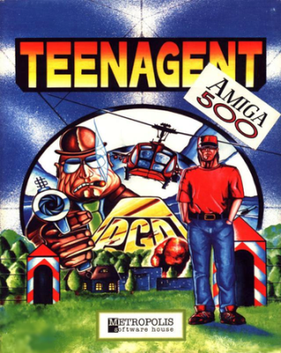
Teenagent is a 1994 point-and-click adventure game developed by Polish developer Metropolis Software House. It was released for Amiga and MS-DOS. The player controls teenage boy Mark Hopper, who wants to be a secret agent. It was the first game to be released on CD-ROM in Poland.

Andrzej Piotr Grabowski is a Polish actor, singer and comedian. He is best known for playing the role of Ferdynand Kiepski in the TV series Świat według Kiepskich.

Magdalena Jadwiga Boczarska is a Polish actress who has appeared in more than 25 feature films since 2001. She has twice received the IFFI Best Actor Award (Female): Silver Peacock Award, at the 41st and the 44th International Film Festival of India for her roles in Little Rose and In Hiding.

Marcin Bosak is a Polish actor. He appeared in more than twenty-five films since 1995.

Tajemnica Statuetki is a Polish-language adventure game developed and published by Metropolis Software House for DOS-based computers in 1993. While it was never released in English, it is known in the English-speaking world as The Mystery of the Statuette. The game was conceived by a team led by Adrian Chmielarz, who used photographs taken in France as static screens within the game. The first title in the adventure game genre that was produced in Poland, its plot revolves around a fictional Interpol agent named John Pollack trying to solve a mystery associated with the thefts of ancient artifacts around the world.

Boyz Don't Cry is an adventure video game developed by L'Art, released on March 30, 2005.
Adrian Chmielarz is a Polish video game designer, programmer, creative director, producer and writer specializing in adventure games and first-person shooters. Chmielarz has co-founded and led Metropolis Software, People Can Fly and The Astronauts. He is one of the most famous Polish video gaming figures, as well as one of the most divisive figures in the industry.

Marienbad was a 1962 Polish puzzle mainframe game created by Elwro engineer Witold Podgórski in Wrocław, Poland for its Odra 1003. It was an adaption of the logic game nim. Inspired by the discussion in the magazine Przekrój of a variant of nim in the 1961 film Last Year at Marienbad, named "Marienbad" by the magazine, Podgórski programmed the game for the in-development 1003 mainframe, released in 1963. The game had players opposing the computer in alternating rounds of removing matches from a set, with the last player to take a match the loser. As the computer always played the optimal moves, it was essentially unbeatable.
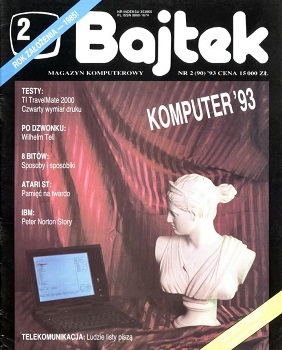
Bajtek is one of the first popular magazines devoted to computer science in Poland. Its title was an reference to the computer term byte and to the American magazine Byte. The founder was Waldemar Siwiński. The magazine was very well-known in the late 1980s in the country. It was published between 1985 and 1996. The magazine was inspired by the British magazine Your Computer and the American magazine Compute!. The sponsor of Bajtek was Polish Socialist Youth Union which is also known is ZSMP.

Top Secret was a Polish magazine devoted to the subject of computer and video games, as well as to culture and events connected with them.

Mózgprocesor is a Polish video game created in 1989, and published in 1990 by Computer Adventure Studio for ZX Spectrum and the Atari 8-bit family (1991). It was Computer Adventure Studio's first and last game. It was created by ex-Atari alumni Piotr Kucharski, Krzysztof Piwowarski and Wiesław Florek. The team had previously created Smok Wawelski in 1987. The script was created within an hour and the whole game was ready after six weeks, without professional graphic programs or documentation. Reviews of the title were featured in Bajtek 10/1998 and Top Secret 1/1990, Top Secret 2/1990 also included an interview with the developers, which at the time was unprecedented for a Polish game.

Solidarność is a 1991 Polish strategy computer game developed by P.Z.Karen Co. under the direction of Przemysław Rokita and published by California Dreams. It was created by Polish programmers specifically for an American audience in order to support a Hollywood film about the life of Lech Wałęsa, which was never actualised. The game never gained popularity and remains virtually unknown to this day.
Solidarność: Menadżer Konspiracji is a 2013 Polish educational game.
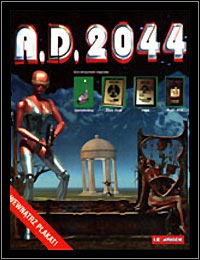
A.D. 2044 is a Polish adventure game by LK Avalon, released September 9, 1996 on Windows.
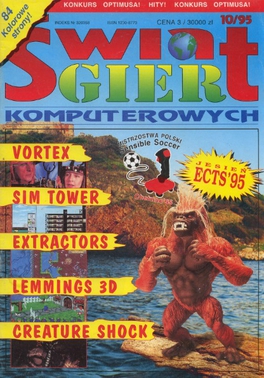
Świat Gier Komputerowych was a Polish video gaming magazine. It was first issue was released on 14 December 1992 as an addition to the Amiga magazine Amigowiec. The permanent editorial team consisted of about 15 people. The first editor-in-chief was Mirosław Domosud, but he was replaced by Piotr Pieńkowski, who held this position until the paper was discontinued. It was intended mainly for older players, written in a more formal style than competitors such as Top Secret and CD-Action. In February 1997, the 50th issue was issued, while April 2001 saw the hundredth issue be published. The magazine celebrated its tenth anniversary in February 2003, being the only such magazine on the market to reach this milestone. The last issue appeared in July 2003 as a double. The decision was due to the unsatisfactory sales of the magazine, around 50,000 copies per month. After its dissolution, an attempt was made to revive the paper as Nowy Świat Gier Komputerowych, however this only lasted for two months.

Polanie is a historical real-time strategy video game developed by MDF and published by USER for DOS and Microsoft Windows in 1996. An enhanced CD version was released next year.
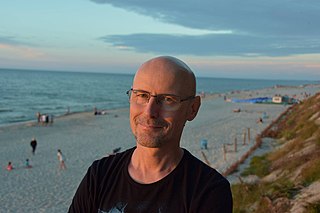
Marcin Sergiusz Przybyłek is a Polish science fiction author, business trainer, coach, computer games designer and consultant, a medical doctor by education.

XYZ was the first Universal Digital Machine from the family of early computers built and launched in Poland in 1958. It was ahead of EMAL2 by a few months, while the earlier EMAL was not fully launched.
References
- ↑ "Historia polskich gier. Jak to się zaczęło? (część 1)". Gamezilla (in Polish). 10 February 2012. Retrieved 2018-03-19.
- ↑ "Historia polskich gier. Jak to się zaczęło? (część 1)". Gamezilla (in Polish). 2012-02-10. Retrieved 2018-03-19.
- ↑ "Historia polskich gier: Początki i Puszka Pandory". www.gra.pl (in Polish). Retrieved 2018-03-19.
- 1 2 "Recenzja książki "Bajty polskie"". Gamezilla (in Polish). 2011-11-10. Retrieved 2018-03-19.
- ↑ "Pierwsza polska gra komputerowa powraca w kolekcjonerskim wydaniu". Gamezilla (in Polish). 2012-10-24. Retrieved 2018-03-19.